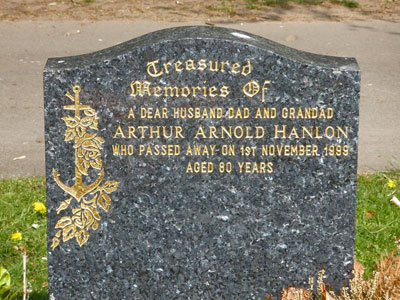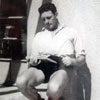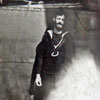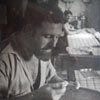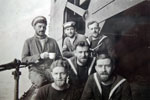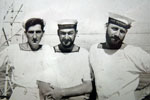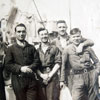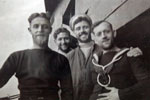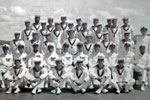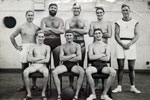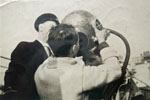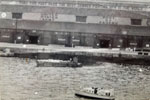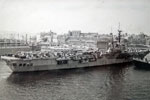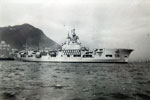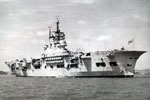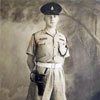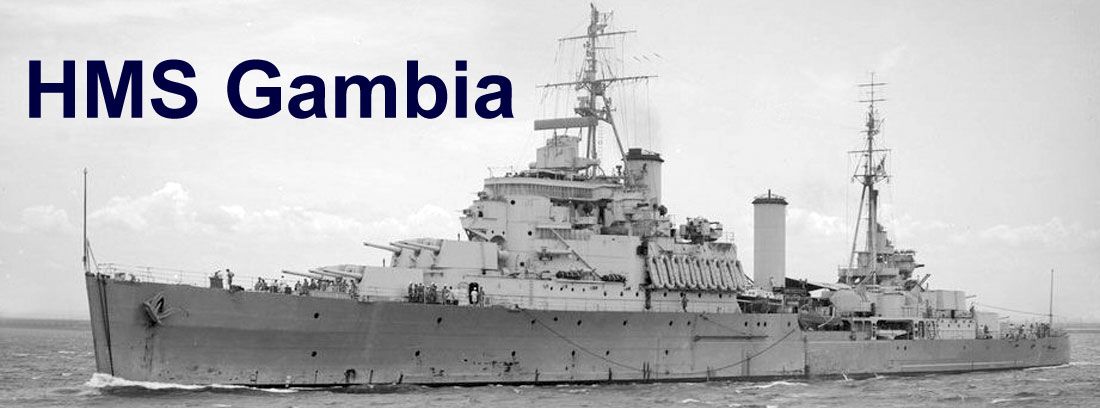
Arthur Arnold Hanlon
From the little I can find of him, Arthur seems to have led an interesting life.
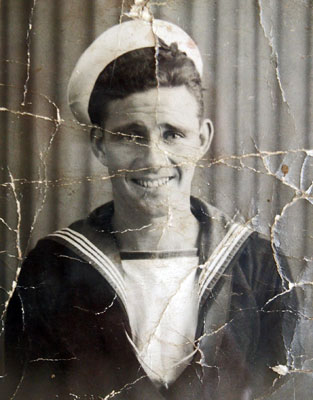 Arthur was born on August 3, 1919.
Arthur was born on August 3, 1919.
Arthur joined the Royal Navy on June 21, 1939 and then left on August 18, 1946. From there he enlisted in the Palestine Police Force. His recruitment number was 9676 and he was attempted as British Constable 2212. He then left the Palestine Police, serving until the end of the British mandate, leaving on June 21, 1948 onboard the SS Empress of Australia.
He then rejoined the Royal Navy on the August 12, 1950 at the Royal Naval Reserve, Devonport. Fought in Korea, then left the Royal Navy once again on April 29, 1970. He gave 25 years of service to the Royal Navy, reaching the rank of Chief Petty Officer.
His service number was D/MX.890912 and he served on HMS Gambia as Petty Officer (Electrical) on the 1958 to 1960 commission.
One of the other ships he served on appears to be HMS Unicorn, an aircraft repair ship and light aircraft carrier. His grandson Alexander Greaves has Arthur's service records and he served on HMS Gambia from November 1, 1956 to December 15, 1960 and then the next ships served on states "HMS Gambia (Victory IV)" December 16, 1960 - January 10, 1961.
Victory were shore barracks, training or paymaster establishments and there were at least sixteen of them between 1900 and 1980. There are lists of them at World Naval Ships Forums and the Great War Forum. Victory IV was based in Crystal Palace, London, Petersfield and finally at Portsmouth where Arthur would have been stationed.
Arthur died on November 1, 1999, aged 80, and is buried in Allerton Municipal Cemetery, Liverpool, Lancashire.
His medals came up for auction in Wellington Auctions, Essex in June 2016. The medals were the 1939-45 Star, Atlantic Star, Africa Star, Italy Star, Defence Medal, War Medal 39-45. The General Service Medal 1918-62, George VI, clasp Palestine 1945-48 named to 2212 B/Constable A.A. Hanlon, Palestine Police. Queens Korea Medal, named to D/MX.890912 A.A. Hanlon, Acting Leading Electrical Mechanic, Royal Navy. United Nations Medal for Korea. The Royal Naval Long Service and Good Conduct Medal, Elizabeth II.
The medals seem to going through several auctions. In 2010, they turned up in DNW Auctions in London and were sold for £270. In 2016, they were worth between £400 and £500.
After writing the above I was contacted by his grandson, Alexander Greaves, who asked if I knew anything else about him. I am not a genealogical researcher so what follows is conjecture and may be a coincidence.
It's interesting that Arthur joined the Royal Navy in 1947. By then he was already 28. That is getting on a bit to join any of the armed services - most were and are in their late teens or early twenties. He'd already served in WWII, so maybe after being demobbed he decided to rejoin.
There is a notice in The London Gazette of 27 July, 1943 that says that a Arthur Arnold O'Hanlon changed his surname to Hanlon.
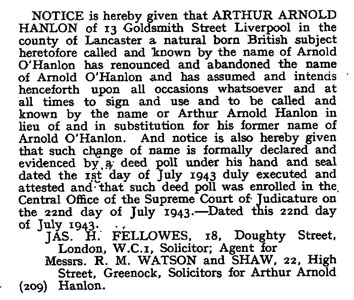 NOTICE is hereby given that ARTHUR ARNOLD HANLON of 13 Goldsmith Street Liverpool in the county of Lancaster a natural born British subject heretofore called and known by the name of Arnold O'Hanlon has renounced and abandoned the name of Arnold O'Hanlon and has assumed and intends henceforth upon all occasions whatsoever and at all times to sign and use and to be called and known by the name or Arthur Arnold Hanlon in lieu of and in substitution for his former name of Arnold O'Hanlon.
NOTICE is hereby given that ARTHUR ARNOLD HANLON of 13 Goldsmith Street Liverpool in the county of Lancaster a natural born British subject heretofore called and known by the name of Arnold O'Hanlon has renounced and abandoned the name of Arnold O'Hanlon and has assumed and intends henceforth upon all occasions whatsoever and at all times to sign and use and to be called and known by the name or Arthur Arnold Hanlon in lieu of and in substitution for his former name of Arnold O'Hanlon.
And notice is also hereby given that such change of name is formally declared and evidenced by a deed poll under his hand and seal dated the ist day of July 1943 duly executed and attested and that such deed poll was enrolled in the Central Office of the Supreme Court of Judicature on the 22nd day of July 1943. Dated this 22nd day of July 1943.
JAS. H. FELLOWES, 18, Doughty Street, London, W.C.1, Solicitor; Agent for Messrs. R. M. WATSON and SHAW, 22, High Street, Greenock, Solicitors for Arthur Arnold Hanlon.
Why might he change his name?
From his medals, he obviously served in the military during WWII. When WWII started in 1939 he would have been 20 - service age. Ireland remained neutral during the war but many of their citizens joined the British services. Some of their own servicemen deserted to join the British services. If he did that, he might have good reason to anglicize his name as Irishmen who joined the services were not given a good reception in Ireland (see "The Irish World War II Shame" and "Irish Soldiers Branded Deserters").
Of course, Arthur may have had other reasons for changing his name.
